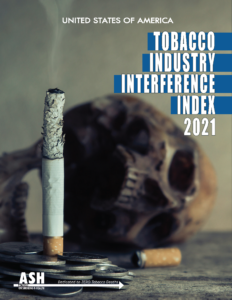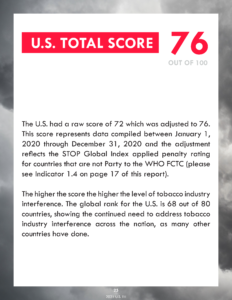Media Contact:
Megan Arendt
arendtm@ash.org
(202) 390 – 9513
U.S. Ranks Among the 15 Worst Performing Countries for Tobacco Industry Interference
ASH’s 2021 Index Compares U.S. Regulations vs. Global Best Practices for Public Health

WASHINGTON, DC – November 4, 2021 – Released today, the 2021 U.S. Tobacco Industry Interference Index reveals the U.S. scored a 76 out of 100, reflecting a high level of interference in American public health policymaking by the tobacco industry and their intermediaries. This score places the country among the worst performing countries in terms of shielding itself from tobacco industry interference. The scoring system is based on the World Health Organization Framework Convention on Tobacco Control (FCTC) which outlines the inherent conflict of interest between the goals of tobacco companies and the goals of public health. Parties to the FCTC meet next week for a biennial review of progress toward a tobacco-free world.
Click here to read the 2021 U.S. Tobacco Industry Interference Index>
“Given the October 26th report from the Federal Trade Commission that cigarette sales rose for the 1st time in the U.S. in 20 years, enacting strong tobacco control best practices has never been more essential,” said Nichelle Gray, Program Coordinator and 2021 Index Co-Author at Action on Smoking and Health. “The U.S. is behind on global standards for dis-engagement with the tobacco industry.”
ASH’s 2021 Index outlines how the U.S. can return to being a global public health leader.
Key Recommendations from the 2021 Index:
1.) Raise awareness of the WHO Framework Convention on Tobacco Control (FCTC) and its provisions regarding tobacco industry interference (Article 5.3) along with its applicability to all 50 states.
2.) Strengthen and standardize revolving door prohibitions.
3.) Close loopholes in executive branch ethics guidelines.
4.) Prevent conflicts of interest in the US Food and Drug Administration drug approval process.
5.) Adopt an official code of conduct for public officials.
6.) Educate lawmakers on tobacco industry interference.
7.) Mandate philanthropic donation disclosure.
 These Recommendations are expanded upon in the report alongside details for each Indicator and the U.S. score. For example: the FDA accepts scientific research from the tobacco industry when regulating their products, a clear conflict given the tobacco industry’s history of using their own scientific research to mislead the public. In fact, the biggest tobacco companies were found to be racketeers by a federal court for their conspiracy to mislead the public about the harms of tobacco.
These Recommendations are expanded upon in the report alongside details for each Indicator and the U.S. score. For example: the FDA accepts scientific research from the tobacco industry when regulating their products, a clear conflict given the tobacco industry’s history of using their own scientific research to mislead the public. In fact, the biggest tobacco companies were found to be racketeers by a federal court for their conspiracy to mislead the public about the harms of tobacco.
Public policy is the most powerful tool available to combat the tobacco epidemic, which kills over 480,000 Americans every year. Tobacco companies use every inch of regulatory wiggle room to insert themselves into public health policy making to weaken life-saving policies.
“We’ve quite literally spent decades working to lessen and end the deadly epidemic created and continued every day by the tobacco industry,” said Laurent Huber, Executive Director of Action on Smoking and Health. “Unlike with many public health challenges, for tobacco we have the solution: exclude the tobacco industry from public health policy making and phase out the sale of commercial combustible tobacco. It’s time we do it.”
ACTION ON SMOKING AND HEALTH
Founded in 1967, Action on Smoking and Health (ASH) is America’s oldest anti-tobacco organization, dedicated to a world with ZERO tobacco deaths. Because tobacco is the leading cause of preventable death worldwide, ASH supports bold solutions proportionate to the magnitude of the problem. https://ash.org








